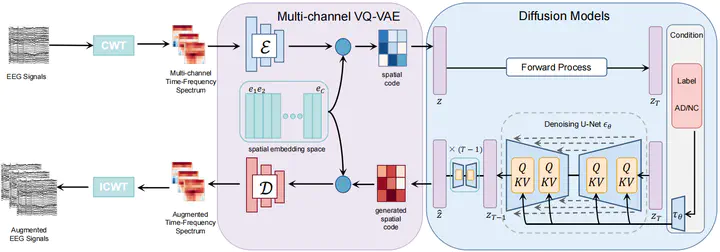Generative AI Enables EEG Data Augmentation for Alzheimer's Disease Detection Via Diffusion Model
 Model Architecture
Model ArchitectureAbstract
Electroencephalography (EEG) is a non-invasive method to measure the electrical activity of the brain and can be regarded as an effective means of diagnosing Alzheimer’s disease (AD). However, The diagnosis of AD based on EEG often encounters the problem of data scarcity. For deep learning models, data scarcity problems lead to overfitting of the model, making it impossible to build effective, highly accurate, and stable models. Data augmentation is often used as an effective means to solve the problem of data scarcity. In this paper, we propose a diffusion models-based EEG data augmentation framework (Diff-EEG). The proposed framework Vector Quantized Variational autoencoders(VQ-VAE) and guided diffusion models to learn the distribution of limited EEG dataset, thereby generating high-quality artificially synthesized EEG data to supplement the dataset. Finally, the result of experiments demonstrate that our proposed method can generate high-quality artificial EEG data, which can effectively improve the performance of AD diagnosis models.